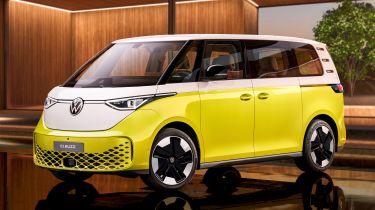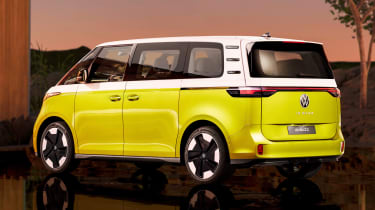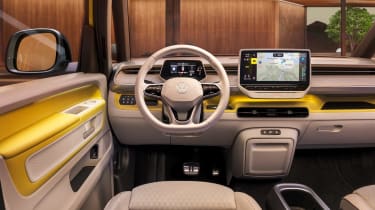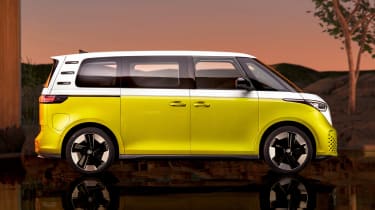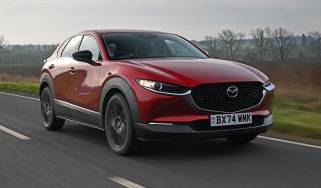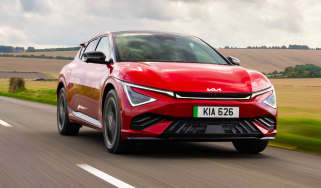Electric Volkswagen ID. Buzz now on sale from £57,115
VW’s retro-styled electric MPV gets a range of 250+ miles and all the latest technology
- Five-seat configuration with cargo van coming soon
- Range of up to 258 miles
- Available to order now
The long-awaited Volkswagen ID. Buzz is now on sale; nostalgia does not come cheap, however, with prices starting from £57,115. The new electric MPV is an homage to the VW Type 2 van of the 1950s, with retro-themed styling and a single-motor EV powertrain.
 Top 10 best eight-seater cars 2025
Top 10 best eight-seater cars 2025
For now, the ID. Buzz is only available as a five-seat MPV; a three-seat commercial Cargo model is going on sale next month, with a long-wheelbase version arriving by 2024. The Buzz is the fourth fully electric model to be added to VW’s pure-electric ‘ID’ model range, joining the ID.3 hatchback, ID.4 SUV and new ID.5 coupe-SUV. Rivals include the Citroen e-SpaceTourer, Mercedes EQV, Peugeot e-Traveller and Vauxhall Vivaro-e Life.
Volkswagen CEO Ralf Brandstätter has stated that the new ID. Buzz is the brand’s “most iconic, emotional and likeable model ever”, with it fulfilling a part of the car maker’s promise to offer at least 70% of its model line-up with an electric powertrain by 2030.
2022 Volkswagen ID. Buzz: trim levels and specifications
Volkswagen is offering the ID. Buzz in three distinct specifications: Life, Style and 1st Edition. Acting as the entry-point into the range, ID.Buzz Life cars get 19-inch alloy wheels, LED headlights, a heated windscreen, a 10-inch central touchscreen with built-in sat-nav, a reversing camera and a removable ‘Buzz Box’ centre console.
Moving up the range, the Style model starts from £61,915 and adds matrix LED headlights with a front light bar, larger 20-inch alloys and a set of stainless steel pedals. Finally, the 1st Edition will set back buyers £62,995; this model boasts kerb-clipping 21-inch wheels, electric front seats with memory function and a larger 12-inch central touchscreen.
Design and styling
The design of the Volkswagen ID. Buzz looks largely similar to the concept cars that first appeared in 2017. It gets a boxy van-like shape, with a steeply angled nose and long roofline.
Look closely at the styling, and it’s clear the model borrows styling cues from the VW’s of old, mixed with elements of the brand’s current EV model range. At the front, it features a slim headlight design similar to the ID.3 and ID.4, and a full-width LED light bar sitting above the blanked-off front grille. Beneath this, the front bumper has hexagonal air intakes running the full width of the nose.
The car’s side profile starts with an upright front windscreen, with a pair of sliding side doors and large aerodynamic alloy wheels. Like the other VW ID. models, the charging port is located in the lower part of the rear quarter panel in the bumper. At the rear, there’s a full-width tailgate along with a slim LED tail light design and a full-width light bar. The two-tone paintwork seen here will be available as an option, with a white upper section that can be matched with a choice of contrasting colours including yellow, orange, blue or green.
Platform, powertrains and charging
Like all of the Volkswagen ID models, the ID. Buzz is based on the brand’s MEB platform, which has been designed specifically for pure-electric cars. It’s already used in several VW Group models, including the Audi Q4 e-tron, Cupra Born, Skoda Enyaq iV and VW ID.3 and ID.4.
At launch, the ID. Buzz is only available with a 201bhp single-electric motor set-up that is shared with the ID.3 and ID.4 and a 77kWh battery. Exact range figures will depend on specification and wheel size; however, VW claims the ID. Buzz will be able to manage up-to 258 miles on a single charge. Rapid charging will also feature, with speeds of up to 170kW. This means a 10-80% charge will take around half an hour, while a full recharge from a 11kW home wallbox will take around 13 hours.
Interior and technology
The inside of the ID.Buzz bears a strong resemblance to the other ID.-branded models, with a two-tier clean dashboard design. The upper half features high-mounted air vents and a wood contrasting trim piece sitting in a silver surround, while below sits a brightly coloured contrasting colour trim piece housing the centre air vents and a pair of storage cubbies. There’ll be a number of personalisation options available, and buyers will be able to specify a choice of two-tone interior colour schemes to match the exterior.
At launch, the ID. Buzz is only being offered with five seats in a 2-3 configuration. Practical features include up to eight USB-C charging sockets dotted around the interior, and several storage options including what VW fittingly calls a ‘Buzz Box.’ This central storage bin is located between the front seats and features an upper drawer to store an ice scraper and a bottle opener, along with a larger five-litre drawer beneath for larger items.
The interior is trimmed in a mix of synthetic and recycled materials, including faux leather trim on the steering wheel along with fabric trimmed seats. The use of these materials is designed to make the production and delivery of the ID. Buzz completely carbon neutral.
There’s the usual array of ID.Buzz brand technology, too, with a 5.4-inch Virtual Cockpit digital dial cluster, along with a 10-inch infotainment touchscreen mounted on top of the dashboard. In higher-spec models, a 12-inch central screen is fitted.
Practicality and dimensions
The ID. Buzz features fairly compact dimensions, measuring at 4.7m long with a wheelbase of 2.98m. This helps to maximise both passenger and luggage space, with a vast 1,121 litre boot in five-seat mode. It also gets a 60:40 folding split rear seat, which makes it easy to load longer items. Fold the rear seats and storage increases to 2,205 litres.
For buyers who want more seating, a long-wheelbase version of the ID. Buzz will arrive in 2024 with a choice of six or seven-seat layouts.
Safety
The new model gets all of VW’s latest safety technology, with front assist, which includes autonomous emergency braking and pedestrian and cyclist monitoring, lane assist, dynamic road sign display, emergency calling and a driver alertness monitor. It also features Car2x connectivity tech, which is capable of alerting the driver of heavy traffic or any hazards on a route.
Read our top picks for the best electric cars and the best electric SUVs you can buy today.
Recommended
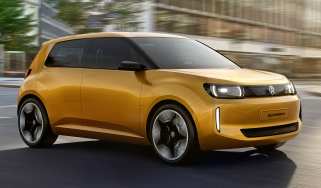
New Volkswagen ID.Every1 previews the affordable electric future of VW
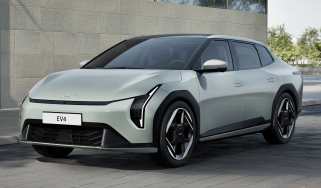
New Kia EV4 offers futuristic family-car looks and 391-mile range
Most Popular
Tips & advice

Car dashboard warning lights: what does each symbol mean?

Electric car charging stations: public networks, charger types, apps and maps


